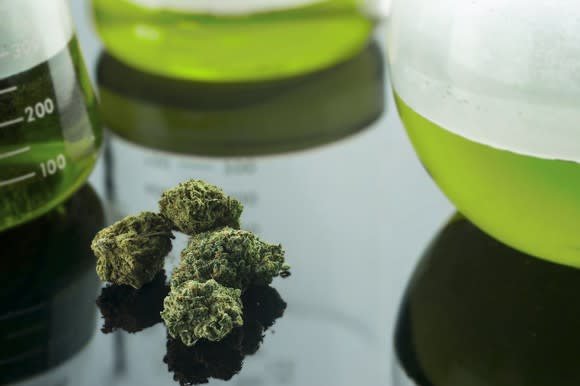Better Marijuana Stock: Aphria vs. GW Pharmaceuticals
Aphria (NASDAQOTH: APHQF) and GW Pharmaceuticals (NASDAQ: GWPH) are both in the medical marijuana industry. However, the companies have very different business models. Aphria ranks among the largest cannabis growers in Canada, while GW Pharmaceuticals is a cannabinoid-focused biotech.
GW Pharmaceuticals has been the much bigger winner for investors so far this year. Its share price is up more than 10%, while Aphria stock is down nearly 40%. But which of these two marijuana stocks is the better pick now? Here's how Aphria and GW compare.

Image source: Getty Images.
The case for Aphria
If you're looking for the stock of a company that should soon post astronomical revenue growth, Aphria should be an excellent candidate. When Aphria reported its Q3 results in April, its sales totaled 10.3 million Canadian dollars ($8.2 million). That was an all-time high for Aphria, but it will probably be only chump change compared to what the company could make later this year.
Canada's market for adult use of recreational marijuana opens nationwide in October 2018. Aphria appears to be poised to capture a significant share of that market. The company is ready to target what could be a large retail customer base thanks to its partnership with Southern Glazer's, the largest wine and spirits distributor in North America.
Aphria also has cranked up its production capacity in anticipation of tremendous demand for both medical and recreational marijuana. The company expects to be able to deliver 225,000 kilograms per year by early 2019.
There are even more opportunities for Aphria outside of its home country. Germany legalized medical marijuana last year. Aphria's acquisition of another Canadian marijuana grower, Nuuvera, provided an entree into the German market. And while Aphria dialed back its initial plans to expand in the U.S. due to the threat of its stock being delisted from the Toronto Stock Exchange, the company should be able to quickly jump back into the U.S. market should federal marijuana laws change.
It's possible that Aphria could find a major partner in the not-too-distant future. Large alcoholic beverage company Molson Coors Brewing reportedly has been in talks with a few Canadian marijuana growers about making an investment and developing cannabis-infused beverages. Aphria is said to be among the top candidates if Molson Coors moves forward with its plans.
The case for GW Pharmaceuticals
GW Pharmaceuticals hasn't made a ton of money off of its first cannabis-based product, Sativex. The drug is sold in several countries -- but not the U.S. -- as a treatment for multiple sclerosis (MS) spasticity. However, GW could be rolling in the dough relatively soon.
The biotech won U.S. Food and Drug Administration (FDA) approval in June for Epidiolex in treating Dravet syndrome and Lennox-Gastaut syndrome (LGS), both of which are rare forms of epilepsy. Epidiolex became the first plant-based cannabinoid drug to be approved in the U.S. One additional hurdle remains before Epidiolex reaches the market, though. The Drug Enforcement Administration (DEA) must classify the drug into one of five schedules for narcotics.
It's possible that Epidiolex could rake in peak annual sales of around $1 billion. Some analysts are even more optimistic about the drug's prospects. Market research firm EvaluatePharma ranked Epidiolex as one of the top 10 biggest new drug launches of 2018, with sales approaching $1 billion by 2022.
GW Pharmaceuticals also hopes to win approval for Epidiolex in Europe for treating Dravet syndrome and LGS. A decision from the European Medicines Agency is expected in early 2019. In addition, the biotech is evaluating Epidiolex in a phase 3 clinical study for the treatment of tuberous sclerosis, a genetic disorder where benign tumors grow on various parts of the body.
More cannabinoid drugs could also be on the way. GW is conducting a phase 3 clinical trial of Sativex in hopes of bringing the drug to the U.S. market as a treatment for MS spasticity. The company is studying cannabinoids in treating autism spectrum disorders, epilepsy, glioblastoma, neonatal hypoxic-ischemic encephalopathy (HIE), and schizophrenia as well.
Better marijuana stock
There are some negatives for each of these marijuana stocks. Aphria could be at risk if supply outstrips global demand for marijuana within the next two or three years. GW Pharmaceuticals might run into challenges obtaining reimbursement for Epidiolex.
My view is that GW Pharmaceuticals is probably in a better position to meet expectations. There's no guarantee that will happen, of course. However, I think GW's risks aren't as great as Aphria's are. The biotech definitely doesn't face the amount of competition that Aphria does. While it's possible that Aphria stock could soar if it lands a partnership with Molson Coors, I see GW Pharmaceuticals as the better pick between these two marijuana stocks over the long run.
More From The Motley Fool
Keith Speights has no position in any of the stocks mentioned. The Motley Fool owns shares of TAP. The Motley Fool has a disclosure policy.

 Yahoo Finance
Yahoo Finance 